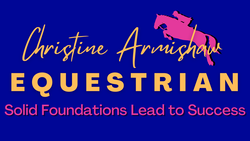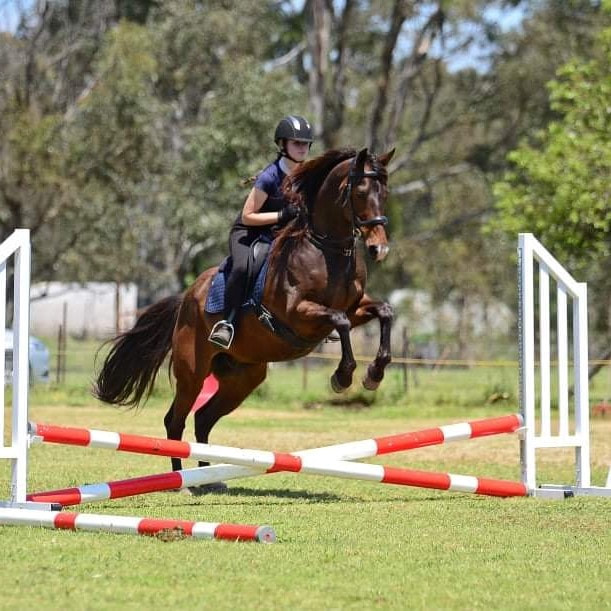Magnesium Oxide
Magnesium Oxide is important to include in your horse's diet, especially while the grass is growing rapidly (spring, autumn and other times of high-rainfall during warm weather).
Magnesium is an essential mineral and something that a horse cannot produce within it's own body, it needs to be included in the diet.
Adding Magnesium Oxide to the diet of a horse that is lacking can help alleviate a range of symptoms. Because magnesium is required formuscle relaxation (calcium is required for muscle contraction), you may see various displays of both muscular and mental tightness.
If you notice your horse acting out of character and displaying some of these symptoms, then adding Magnesium Oxide to the diet is strongly recommended.
- Symptoms include:On edge
- Unable to relax physically or mentally
- Anxious
- Overreactive
- Muscles like 'guitar strings', tremors or twitches, especially if you run your fingers across them
- Touchy or reactive to grooming
- Body tension
- Struggles to pick up a canter lead
- Bucking, rearing, pig-rooting midway through a ride for no apparent reason
- Over-sensitive to sound or movement
- Herd bound
- Particularly 'marey' or 'colty'
- Unpredictable
So long as you are feeding either a 'complete' balanced feed (a pre-made store bought feed) at the recommended amount, OR you are supplementing with a good quality multi-mineral mix, then feeding straight Magnesium Oxide like this will be readily absorbed by your horse. Generally, Magnesium Oxide is not absorbed if there is no deficiency present, meaning overdose is difficult when using this source.
Feeding Guide (based on average 500kg horse):
- Feed at a loading rate of 1 full scoop - scoop supplied (equivalent to approx. 2x Tablespoons) per day mixed into feed for the first two weeks
- Reduce down to 1/2 scoop as a maintenance rate
- Increase or decrease depending on size of your horse
- If your horse doesn't like the taste, try introducing gradually, or splitting it across multiple feeds, or mixing in with small amount of palatable feed they enjoy
Note: When the grass is lush and continuing to grow extremely rapidly, keeping your horse on 1 full scoop may be more appropriate.
Adding plain, non-iodised salt to your horse's diet is recommended to help counteract the high levels of potassium also found in lush, green grass.
For further information, watch this short video on Why the grass could be making your horse 'Bad' - and how to stop it.
"I personally feed all my horses magnesium oxide all year round, along with plain (non-iodised) salt. I feed toxin binder during seasons of high grass growth, as that is typically when fungus and mycotoxins are more prolific. The difference I notice in my horses, as well as in clients' horses that I work with during coaching and training, is significant. These are small essentials that I find make such a big difference and the potential impact on horse well-being and thus rider safety is well worth it. This is why I specifically stock these products and why they are ones I cannot live without."
~ Christine Armishaw, EA Level 1 Coach, 20+ years horse trainer & qualified veterinary nurse
If you would like to discuss the challenges you are experiencing with your horse and if Magnesium Oxide may be right for you, send me an email or give me a call on 0490 822 309, I'm happy to help.
Shipping rates are available for weights of up to 2kg total and up to 5kg total. Feel free to mix'n'match products in your order to make the most of shipping options.
Magnesium Oxide is a nutritional supplement product for inclusion in horse's feed. Product has no therapeutic effect and is designed to be administered in a feed for voluntary ingestion for horses.
Toxin Binder - Mycosorb A+
Toxin Binder is useful to add to your horse's diet when there are signs of mushrooms or other fungus in their pasture, as it is likely there are mycotoxins (another type of fungus) present. This typically occurs in warm, wet conditions (spring, autumn and other times of high-rainfall during warm weather). Pastures containing Rye grass are particularly susceptible to producing mycotoxins, as is Paspalum, and when your horse eats these grasses, they are also ingesting the fungus.
Toxin binder works by binding the potentially harmful mycotoxins and allowing the horse to pass them through, without being absorbed during digestion. This particular toxin binder, Mycosorb A+, is based on a specific yeast strain (Saccharomyces cerevisiae) and has been shown to bind a wide variety of mycotoxins, including aflatoxins, but does it without binding nutrients and minerals the way clay-based toxin binders do.
"Backed by more than 18 years of research and patent-protected technology, Mycosorb A+ is the successor to Europe's number one selling mycotoxin binder."
Adding Toxin Binder to the diet of a horse supports the immune system and for a horse that is affected by mycotoxins can help alleviate a range of symptoms.
Symptoms include:
- Wide-eyed and spooky
- Agitated or anxious
- Girthiness
- Unable to move freely or showing stiffness of joints
- Head flicking
- Weight-loss or general dullness
- Stunted growth
- Reproductive issues
- Neurological disorders
These skin conditions, which are fungus-based and present as scabby patches, are also a result of mycotoxins in the body:
- Photosensitivity, which looks like sunburn on the nose
- Mud fever or greasy heel
- Rain scald
Another great benefit to this toxin binder, Mycosorb A+, is that is contains brewers yeast which is great for improving your horse's gut health, improving the 'good bacteria' in the gut.
Biotin is typically feed as a supplement to help improve the structure of the hooves. Being a brewers yeast base, Mycosorb A+ is also naturally high in Biotin, providing a key building block for strong, healthy horse hooves.
Feeding Guide (based on average 500kg horse):
- Feed at a loading rate of 2 full scoops - scoop supplied (equivalent to approx. 2x Tablespoons) per day mixed into feed for the first two weeks
- Reduce down to 1 scoop as a maintenance rate
- Increase or decrease depending on size of your horse
- If your horse doesn't like the taste, try introducing gradually, or splitting it across multiple feeds, or mixing in with small amount of palatable feed they enjoy
Note: When the grass is lush and mushrooms are visibly present and popping up, keeping your horse on 2 full scoops may be more appropriate.
Adding plain, non-iodised salt to your horse's diet is recommended to help counteract the high levels of potassium also found in lush, green grass.
For further information, watch this short video on Why the grass could be making your horse 'Bad' - and how to stop it.
"I personally feed all my horses magnesium oxide all year round, along with plain (non-iodised) salt. I feed toxin binder during seasons of high grass growth, as that is typically when fungus and mycotoxins are more prolific. The difference I notice in my horses, as well as in clients' horses that I work with during coaching and training, is significant. These are small essentials that I find make such a big difference and the potential impact on horse well-being and thus rider safety is well worth it. This is why I specifically stock these products and why they are ones I cannot live without."
~ Christine Armishaw, EA Level 1 Coach, 20+ years horse trainer & qualified veterinary nurse
If you would like to discuss the challenges you are experiencing with your horse and if Toxin Binder may be right for you, send me an email or give me a call on 0490 822 309, I'm happy to help.
Shipping rates are available for weights of up to 2kg total and up to 5kg total. Feel free to mix'n'match products in your order to make the most of shipping options.
Mycosorb A+ is a nutritional supplement product for inclusion in horse's feed. Product has no therapeutic effect and is designed to be administered in a feed for voluntary ingestion for horses.

